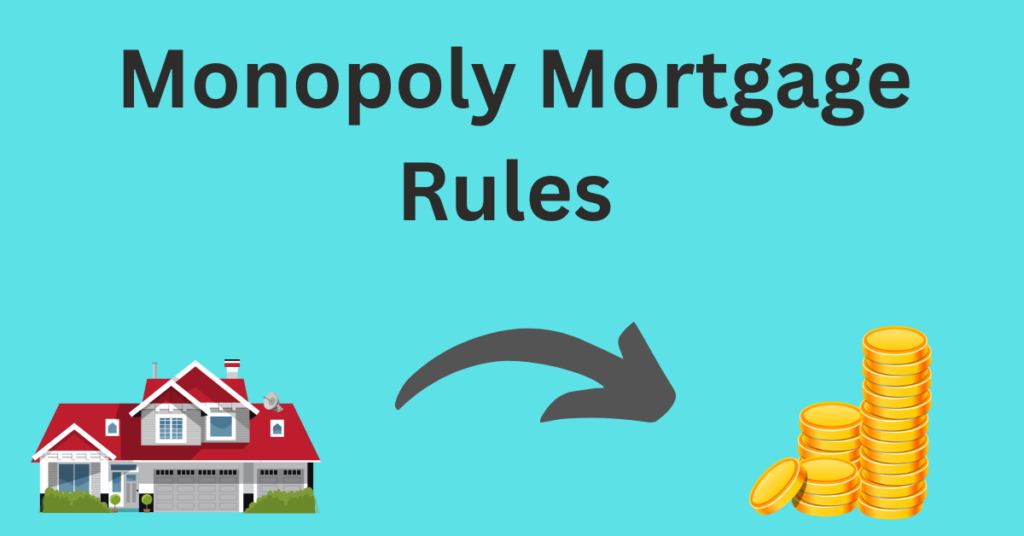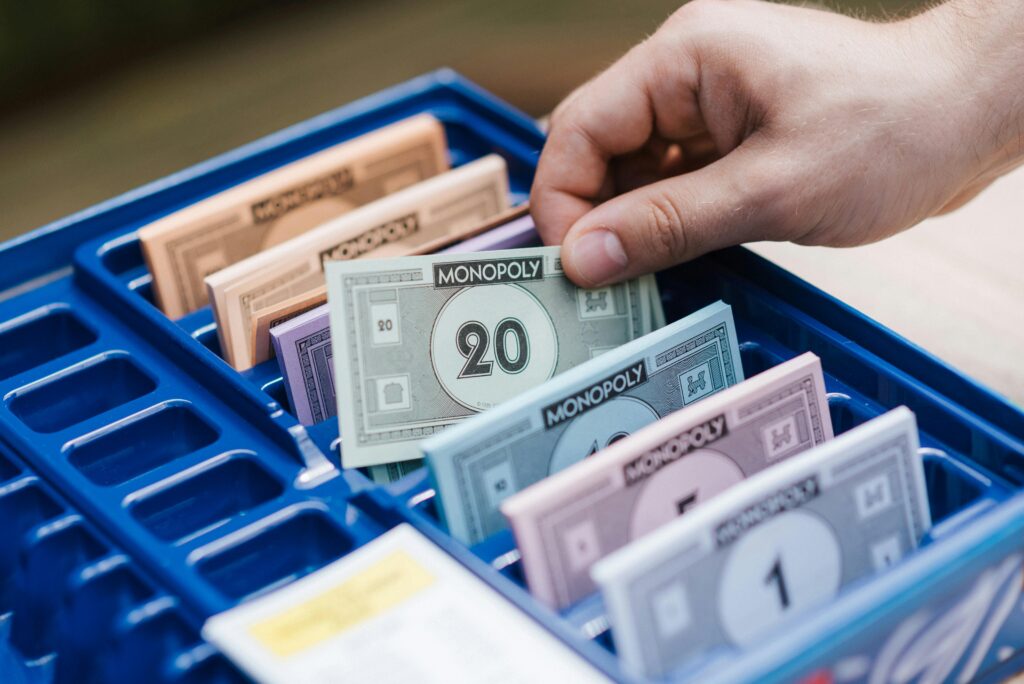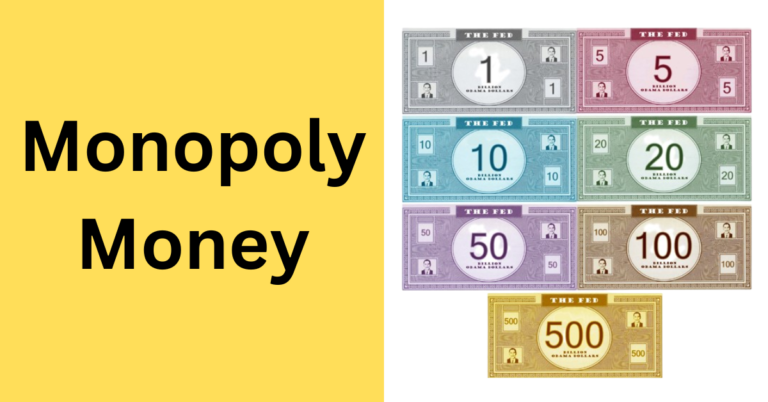Monopoly Mortgage Rules – Learn A Game Changer Strategy
Understanding the mortgage rules in Monopoly can be a game-changer. Whether you’re a seasoned player or just getting started, mastering the art of mortgaging properties can give you the edge you need to dominate the board. In this guide, we’ll break down everything you need to know about Monopoly mortgages, from the basics of how they work to advanced strategies that can help you outsmart your opponents.

The Basics: What is a Mortgage in Monopoly?
In Monopoly, a mortgage is a mechanism that allows you to temporarily relinquish the income-generating capabilities of a property in exchange for immediate cash.
When you mortgage a property, you receive half of the property’s purchase price from the bank. This can be a lifeline when you’re cash-strapped and in desperate need of funds to pay rent, and fines, or to make strategic investments elsewhere on the board.
How Mortgages Fit into the Game’s Strategy?
Mortgages in Monopoly are not just emergency measures; they are strategic tools that can turn the tide of the game. Knowing when and how to use them effectively can provide a significant advantage.
Strategically, mortgages in Monopoly allow you to free up cash flow without selling your properties, providing a crucial financial boost during key moments like bidding wars or building developments. Mortgaging less essential properties can help you gather funds to invest in high-return assets, enhancing your overall game strategy. However, this decision must be made carefully, as it involves forfeiting potential rent income.

Using mortgages can also be a tactical move to disrupt opponents’ plans. If an opponent is close to completing a color set, mortgaging your properties in that set can delay their progress, giving you time to strengthen your position. Mastering the mortgage rules requires a blend of opportunistic play and foresight. By understanding these dynamics, you can make informed decisions that improve your financial standing, hinder your opponents, and lead you to victory.
When and Why to Mortgage a Property?
Situations That Call for Mortgaging
There are several scenarios in Monopoly where mortgaging a property can be a wise decision. One common situation is when you’re low on cash but face an imminent expense, such as landing on an opponent’s hotel or needing to pay for repairs or fines. In such cases, mortgaging a property provides an immediate infusion of cash to cover these unexpected costs without forcing you to sell any of your valuable assets outright.
Another scenario where mortgaging can be advantageous is during property auctions. If a coveted property is up for grabs, mortgaging some of your less crucial holdings can give you the liquidity needed to outbid your competitors. This is particularly useful early in the game when acquiring properties can set the foundation for your future dominance.
Strategic Advantages of Mortgaging
Mortgaging properties in Monopoly offer several strategic benefits that can enhance your gameplay.
- One of the primary advantages is liquidity. By converting a portion of your property’s value into cash, you gain the flexibility to make critical purchases and investments without having to sacrifice ownership of your assets.
- Another strategic advantage is the ability to disrupt your opponent’s plans. For instance, if an opponent is close to completing a color set, mortgaging your properties within that set can temporarily block their ability to build houses and hotels. This buys you precious time to strengthen your own position and potentially secure other strategic properties.
- Mortgaging can also serve as a defensive tactic. When you find yourself in a precarious financial situation, mortgaging properties can provide a buffer against bankruptcy. This allows you to survive longer in the game and seize opportunities to recover and thrive.
Potential Risks and Downsides
While mortgaging can provide significant benefits, it also entails several risks and drawbacks.
- One of the most immediate issues is the loss of rental income. When a property is under mortgage, you forfeit the ability to collect rent from opponents who land on it.
- Another significant risk is the financial strain of mortgage redemption. To lift the mortgage, you must repay the initial mortgage amount plus an additional 10% interest.
How to Mortgage a Property: Step-by-Step Guide
Declaring the Mortgage
The first step in mortgaging a property is to declare your intention to the other players. Announce which property you plan to mortgage. It’s important to remember that you can only mortgage unimproved properties, meaning any houses or hotels must be sold back to the bank at half their purchase price before you can proceed.

This step is critical and can impact your decision, as selling off improvements can be costly and may reduce your earning potential from those properties in the short term. When declaring the mortgage, ensure all players are aware of your action to maintain transparency. This declaration is not just a formality; it’s a tactical move that can signal to others your current financial strategy, possibly influencing their next moves.
Receiving the Mortgage Value
After declaring the mortgage, you will receive the mortgage value from the bank. The bank provides cash equal to half of the property’s purchase price. This sudden influx of funds can be a lifesaver during pivotal moments in the game, such as when you need to pay a substantial fee, invest in additional properties, or outbid opponents in an auction.
Updating the Property Status
After receiving the mortgage value, the final step is to update the property’s status on the game board. Turn the property deed card face down to indicate it is mortgaged. This visual cue is essential as it clearly shows all players that the property is not currently generating rent and cannot be used for trading or building.
Redeeming a Mortgage: How to Get Your Property Back
Calculating the Cost to Redeem
The first step in redeeming a mortgaged property is understanding the cost involved. When you mortgage a property, you receive half of its purchase price from the bank. To redeem it, you must pay back the mortgage amount plus 10% interest. For example, if you mortgaged a property for $200, you received $100 from the bank. To lift the mortgage, you need to pay $100 (the mortgage amount) plus $10 (10% interest), totaling $110.

Timing Your Redemption for Maximum Benefit
The best time to redeem is when you have a steady cash flow and can afford the redemption cost without jeopardizing other investments or necessary expenses. Consider the game’s current dynamics and your opponents’ positions. If opponents are likely to land on your property soon, redeeming it can quickly turn into a profitable decision.
Advanced Strategies for Using Mortgages
Combining Mortgaging with Property Development
One potent advanced strategy in Monopoly integrates mortgaging with property development, demanding a profound grasp of game dynamics and strategic financial management. Here’s the tactical breakdown: Begin by mortgaging properties not within a monopoly to release liquidity. Subsequently, employ these funds to erect houses or hotels on your monopolized properties.
Using Mortgages to Block Opponents
Using mortgages to block opponents is a clever tactic that can thwart their plans and keep you ahead. If an opponent is close to completing a color set, mortgaging one of your properties within that set can prevent them from developing it, buying you time to strengthen your position.
Can You Collect Rent on a Mortgaged Property?
No, rent cannot be collected on a mortgaged property in Monopoly. Once mortgaged, the property is temporarily out of play, and no income can be generated from it until the mortgage is redeemed by paying off the principal amount plus interest.
What Happens If You Can’t Afford to Redeem a Mortgage?
If you cannot afford to redeem a mortgage, the mortgaged property remains inactive, unable to generate income until you can pay off the mortgage. To raise funds, consider selling houses or hotels on other properties, mortgaging additional properties, or trading strategically with other players. Failure to manage your finances effectively may lead to bankruptcy if debts cannot be managed.
Can You Mortgage a Property at Any Time?
Yes, you can mortgage a property at any time during your turn in Monopoly, except during specific circumstances such as trades involving the property. Mortgaging provides immediate cash flow crucial for settling debts, strategic investments, or navigating financial challenges.
Mastering the rules surrounding mortgages in Monopoly is essential for strategic gameplay. Understanding when to mortgage a property, how to manage cash flow effectively, and the implications of mortgaging on a long-term strategy can make the difference between victory and defeat. Mortgages offer a crucial lifeline during financial challenges, providing immediate liquidity for critical moves like property acquisition or debt settlement.






